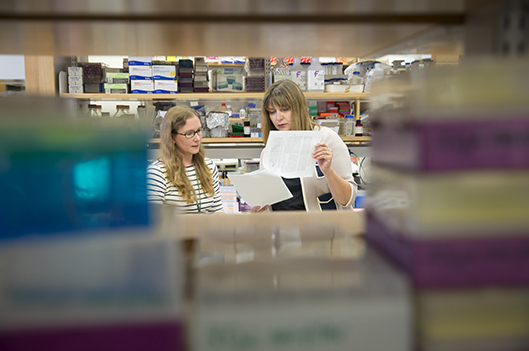
(Learn more about Dr. Malfait)
Active faculty investigators offer opportunities in many basic science and clinical research initiatives. The division’s strong research affiliations with the Basic Science Departments along with the Department of Orthopedic Surgery encourage collaboration.
Recent articles published by our fellows and faculty may be found on [Pubmed]
Our division has particular prominence in the areas of:
- Patient-reported outcomes [Clinical Outcomes Research Lab]
- Osteoarthritis [Plaas Lab] and Musculoskeletal Pain [Lab for Translational Research in OA]
- Systemic lupus erythematosus [Jolly Lab]
- Clinical Trials
- Investigator initiated research
Individual faculty research profiles may be viewed here [Research Profiles]
Chicago Center for Musculoskeletal Pain
C-Comp is a new resource based core Center, supported by P30AR079206 from NIAMS (PI Dr. AM Malfait) that fosters and supports research and training aimed at understanding the mechanisms underlying pain associated with musculoskeletal and rheumatic diseases, with the ultimate goal of better managing and preventing chronic musculoskeletal pain.
C-COMP Mission: To pursue excellence in multidisciplinary translational research into pain associated with rheumatic and musculoskeletal diseases.
C-COMP Vision: To establish a multidisciplinary, innovative, translational, and integrated state-of-the-art center for study of mechanisms underlying painful musculoskeletal diseases.
C-Comp will offer a range of services to support research into mechanisms of pain associated with musculoskeletal diseases. We provide a wide range of services in a Behavioral Core (PI Dr. RE Miller) and a Neurobiology Core (Dr. RJ Miller, Northwestern University); including mouse models, pain-related behaviors in animal models, calcium imaging, electrophysiology, and RNAscope of neuronal tissues.
Members will be able to apply for Pilot grants, and participate in Seminar series, workshops, and training activities.
T32 Training Grant
This multi-disciplinary post-doctoral training program in musculoskeletal biology emphasizes research training in joint health, encompassing three major programmatic areas: osteoarthritis, total joint replacement and small molecule therapeutics. Training will take place in the laboratories of NIH funded faculty in two basic science departments (Cell & Molecular Medicine and Physiology & Biophysics) and three clinical departments (Internal Medicine, Orthopedic Surgery and Pediatrics). The preceptors are internationally respected scientists and physician-scientists devoted to musculoskeletal research, with a special focus on osteoarthritis (including pain), cartilage and bone biology, total joint replacement, and muscle physiology. We encourage candidates with a medical degree to apply in addition to those with PhD’s. After completing our program, the trainees will be better able to become independent, team-oriented, principal investigators. The program also supports 3-month “short-term” slots for medical students. Trainees have many resources available including the Joint Seminar Series, which features internationally renowned scholars.
Learn more about the T32 Training Grant
Master of Science for Clinical Research
Master of Science for Clinical Research (MSCR) is a 5 semester program at RUSH University Graduate College and most trainees are able to complete MSCR during their training period. There are LEAP funds available to trainees within RUSH towards MSCR tuition. Some of our alum Rheumatology fellows completed this program and have found it useful in their pursuit of research career.
Selected Conferences Where Our Fellows and Alumni Present
- American College of Rheumatology (ACR)
- Osteoarthritis Research Society International (OARSI)
- European League Against Rheumatism (EULAR)
- Society of Medical Decision Making (SMDM)
- International Society of Pharmacoeconomics and Outcome Research (ISOPR)
- Lupus International Conference
- Rheumatology Research Foundation (RRF)
- Central Society for Clinical and Translational Research Conference (CSCR)
- Organization for Sex Studies and Disparities (OSSD)
